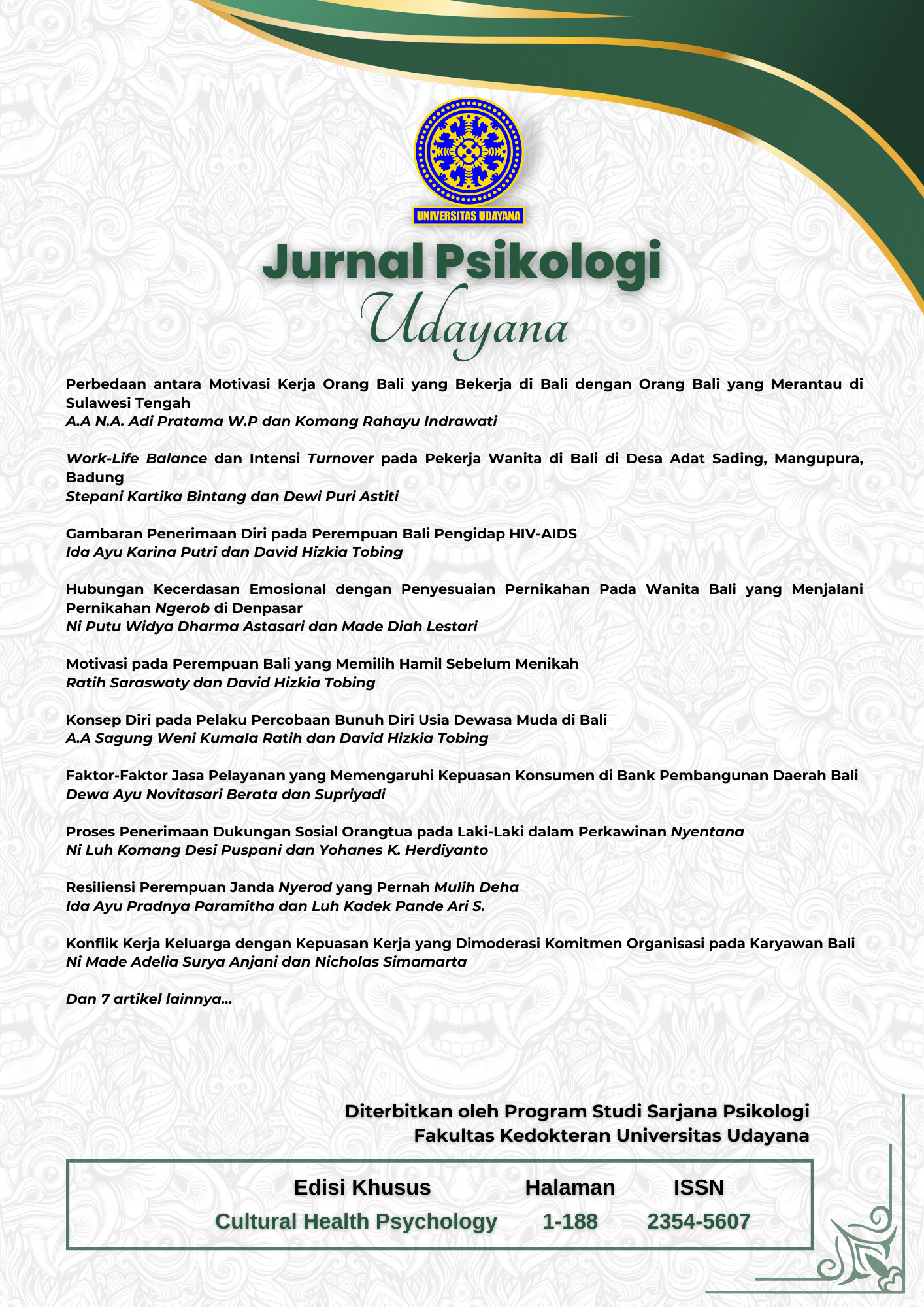HUBUNGAN KECERDASAN EMOSIONAL DENGAN PENYESUAIAN PERNIKAHAN PADA WANITA BALI YANG MENJALANI PERNIKAHAN NGEROB DI DENPASAR
Abstract
Marriage is one of young adulthood’s development tasks. Some problems often arise in the initial period of marriage and disturb the marital adjustment process. In some countries with strong collective culture, a big family involvement is crucial and give an impact to marital adjustment process. In Bali, there is a culture called ngerob. Ngerob is a situation where one of the boys of a family should stay at parents home to continue the obligations and responsibilities of parents in customs, which means that a married man should invite his wife to live in a home with his parents. Adjustment with the partner's family is important in ngerob marriage. In order to reach a success marital adjustment, the wife is expected to have stable emotions. Emotionally intelligent wife is considered to have good self-control, able to express emotions appropriately, so that they can adapt with the circumstances it faces. The aim of this research is to determine the relation between emotional intelligence and marital adjustment among Balinese women who are ngerob in Denpasar.
Subjects were Balinese woman who are married, living with in-laws (ngerob) and live in Denpasar (n=60). Data were collected through emotional intelligence questionnaire with and the marital adjustment questionnaire with. The data were analyzed using product moment correlation test. The correlation coefficient between emotional intelligence and marital adjustment are 0.503 with a significance level of 0.000 (p <0.05). The results of this research showed that there is a positive and significant correlation between emotional intelligence and marital adjustment among Balinese women who are ngerob in Denpasar. The higher level of emotional intelligence encourage a better marital adjustment process among Balinese women who are ngerob in Denpasar.
Keywords : emotional intelligence, marital adjustment, ngerob
Downloads
References
Annisa, N., & Handayani, A. (2012). Hubungan antara konsep diri dan kematangan emosi dengan penyesuaian diri istri yang tinggal bersama keluarga suami. Jurnal Psikologi Pitutur, 1, 57-67. Diakses pada 6 April 2014 dari http://jurnal.umk.ac.id/index.php/ PSI/article/view/36
Anjani, C., & Suryanto. (2006). Pola penyesuaian perkawinan pada periode awal. INSAN, 198-210. Diakses pada 5 April 2014 dari http://journal.unair.ac.id/filerPDF/05%20-%20Pola%20Pe nyesuaian%20Perkawinan%20pada%20Periode%20Awal.pdf
Arsana, I. G. (1990). Tata kelakuan di lingkungan pergaulan keluarga dan masyarakat setempat daerah Bali. Denpasar: Departemen Pendidikan dan Kebudayaan.
Astasari, N. W. (2014). Gambaran penyesuaian pernikahan pada wanita Bali yang menjalani pernikahan ngerob (studi kasus tidak dipublikasikan). Denpasar: Program Studi Psikologi Fakultas Kedokteran Universitas Udayana.
Azwar, S. (2012). Metode penelitian. Yogyakarta: Pustaka Belajar.
Donna, D. F. (2009). Penyesuaian perkawinan pada pasangan yang menikah tanpa proses pacaran (ta’aruf). Skripsi. Diakses pada 29 April 2014 dari http://www.gunadarma.ac.id/library/articles/graduate/psychology/2008/Artikel_10503039.pdf
Fernandez, P. (2012). Gender difference in emotional intelligence: The mediating effect of age. Behavioral Psychology, 20, 77-89. Diakses pada 3 Desember 2014 dari http://www.researchgate.net/profile/Rosario_Cabello/publication/230887032_Diferencias_de_sexo_en_inteligencia_emocional_efecto_de_mediacin_de_la_edad/links/0fcfd5130e9a66178d000000.pdf
Fitroh, S. F. (2011). Hubungan antara kematangan emosi dan hardiness dengan penyesuaian diri menantu perempuan yang tinggal di rumah ibu mertua. Jurnal Psikologi Islam, 83-98. Diakses pada 20 Maret 2014 dari http:// www.library.gunadarma.ac.id/journal/view/6012/hubungan-antara-kematangan-em osi -dan-hardiness-dengan-penyesuaian -diri-menantu-perempuan-yang-tinggal-di-rumah-ibu-mertua.html/
Goleman, D. (1995). Emotional intelligence. New York: Bantam book.
Goleman, D. (2001). Kecerdasan emosional: Mengapa EI lebih penting daipada IQ. Jakarta: PT Gramedia Pustaka Utama.
Gunarsa, Y. S. (2012). Psikologi untuk keluarga. Jakarta: Libri.
Hurlock, E. B. (1993). Suatu pendekatan sepanjang rentang kehidupan. Jakarta: Erlangga. Landis, M., & Judson. (1970). Building your life building a successful marriage teen-agers' guide for living. New York: Prentice-Hall. Inc.
Lestari, S. (2012). Psikologi keluarga. Jakarta: Kencana.
Narayana, A. R., Astasari, N. W., Natalya, N. P., & Shintyadhita, P. N. (2013). Marital satisfaction of balinese women in ngerob family. Dinamics of Balinese Marriage, 36-48. Denpasar: Centre For Health and Indigenous Psychology.
Papalia, D. E., Old, S. W., & Feldman, R. D. (2008). Psikologi perkembangan. Jakarta: Kencana.
Pudjiastuti, E., & Santi, M. (2012). Hubungan antara asertivitas dengan penyesuaian perkawinan pasangan suami istri dalam usia perkawinan 1-5 tahun di kecamatan Coblong Bandung. Prosiding Seminar Nasional Penelitian dan PKM: Sosial, Ekonomi, dan Humaniora, 9-16. Diakses pada 6 April 2014 dari http://prosiding. lppm.unisba.ac.id/ index.php/sosial/article/view/280
Qonitatin, N. (2012). Penyesuaian perkawinan dengan kecendrungan kesenjangan konsep peran suami istri. Promoting Harmony in Urban Community: A Multi Perspective Approach (p. 128). Surabaya: Fakultas Psikologi Universitas Surabaya. Diakses pada 3 April 2014 dari http://eprints.undip.ac.id/40397/1/UBAYA_NQ.pdf
Republik Indonesia. (1974). Undang-undang no. 1 tahun 1974 tentang perkawinan. Diakses pada 2 Mei 2014 dari http://luk.staff.ugm.ac.id/atur/UU1-1974Perkawinan.pdf
Rustika, I. M. (2014). Faktor-faktor yang mempengaruhi prestasi akademik pada remaja (disertasi tidak dipublikasikan). Yogyakarta: Program Doktor Psikologi Fakultas Psikologi Universitas Gadjah Mada.
Spanier, G. B. (1976). Measuring dyadic adjustment: New scales for assessing the quality of marriage and similar dyads. Journal of Marriage and Family, 15-28. doi: 10.2307/350547
Sriastuti, A. (2010). Relasi antara menantu perempuan dan mertua perempuan dalam bingkai feminisme di "istri untuk putraku" karya Ali Ghalem. Dinamika Bahasa & Ilmu Budaya, 86-103. Diakses pada 21 Januari 2015 dari http://www.unisbank.ac.id/ ojs/index.php/fbib1/article/ viewFile/457/pdf
Sugiyono, P. D. (2013). Metode penelitian kombinasi (mixed method). Bandung: Alfabeta.
Surya, T. F. (2013). Kepuasan perkawinan pada istri ditinjau dari tempat tinggal. Calyptra, 1-13. Diakses pada 7 Mei 2014 dari http://journal.ubaya.ac.id/index.php/jimus/ article/viewFile/213/ 189
Wismanto, Y. B. (2010). Pondok mertua indah. Majalah Hidup, 39. Diakses pada 16 Mei 2015 dari http://eprints.unika.ac.id/229/1/PONDOK_MERTUA_INDAH.pdf
Authors who publish with this journal agree to the following terms:
- Authors retain copyright and grant the journal right of first publication with the work simultaneously licensed under a Creative Commons Attribution-ShareAlike 4.0 International License that allows others to share the work with an acknowledgement of the works authorship and initial publication in this journal.
- Authors are able to enter into separate, additional contractual arrangements for the non-exclusive distribution of the journals published version of the work (e.g., post it to an institutional repository or publish it in a book), with an acknowledgement of its initial publication in this journal.
- Authors are permitted and encouraged to post their work online (e.g., in institutional repositories or on their website) prior to and during the submission process, as it can lead to productive exchanges, as well as earlier and greater citation of published work (See The Effect of Open Access).













